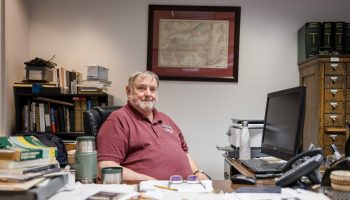
Kaitlyn Finchler
Contributing Writer
Public policies aren’t just laws created to run the country — they are policies based on morality, on religion, whether or not the people creating the laws identify as religious.
Liz Bucar, a leading expert in religious ethics, professor of religion at Northeastern University and prize-winning author, will deliver her lecture “The Protestant Template: How Hidden Religious Bias Shapes American Law” at 2 p.m. today in the Hall of Philosophy.
Hers is the first presentation for the Week Seven Interfaith Lecture Series theme “Whose Body, Whose Choice? Religion, Sexual Politics, and the Law.”
“Some of the context of the religious bias that’s baked into U.S. law, we talk about that often as a Protestant bias,” Bucar said.
As an expert witness in legal cases, Bucar said she’s going to give examples from some court cases she’s testified for.
One case in particular involved a Muslim woman suing the police after they “forcibly removed” her head scarf.
Part of Bucar’s job includes translating for the court and the judge, asking “what is the role of scholars” in these conversations.
“How can we help the courts understand what a hijab means?” she said. In raising that question, it can lead to the court grapple with “why having it forcibly removed is harmful and what that harm looks like.”
Some “bigger questions” Bucar said she plans to touch on, as a person who doesn’t identify as religious — albeit her position as a religious scholar — include the concept of religion having an important and “robust place” in conversations about morality.
“You might think that I’m advocating for taking more religion out of the public or out of the law,” Bucar said. “And instead, when we try to do that, we try to be neutral, all we actually end up doing is that neutrality is masking often the dominance of one religious viewpoint, which is usually a Protestant Christian one, and it starts to appear that that’s the normal or secular (view).”
In actuality, Bucar said she is “all about more religion,” not less. She said she wants more voices and more perspectives in public conversations because it leads to more religious pluralism and more religious liberty.
“The truth is that there’s no such thing as religiously neutral public policy,” she said. “A lot of our public policies reflect moral assumptions, and a lot of people’s moral assumptions are grounded in religious traditions and have religious roots.”
Bucar said she identifies as “one of those people” because she’s an educator and feels the more there is “out in public,” the more robust a conversation can be had.
“Instead of pretending that we’re having this purely rational or this secular reasoning happening, I don’t think that’s actually ever what’s happening,” Bucar said. “It’s not even a question about whether religious values will influence law or politics, but that they do, like facts.”
The more this ideology is acknowledged, Bucar said the more people can be more clear about taking religious values into consideration, whose beliefs are being marginalized and if it’s a problem to be solved.
Bucar said she’s most excited for the Q-and-A portion following the lecture because she loves the “back-and-forth” conversation.
“I’m hoping that (the lecture and Q-and-A) will help people think a little bit more robustly about the interaction of religion and law,” she said. “… Thinking about, what’s our role? What is everyone in the (Hall of Philosophy’s) role? What role could we all take in changing the way we thought about religious pluralism in the U.S.?”
Beyond the Q-and-A, Bucar said she plans to hand out business cards with a link to her Substack page, where she hopes people will share their thoughts and experiences navigating religion and law, faith and politics, and belief and belonging.
“That kind of conversation, if it can happen in a space that can get started at a place like Chautauqua but then be continued somehow, I would love to be there and comment, talking to people afterwards,” Bucar said. “Even beyond our Q-and-A period, (asking) how could we reimagine religion in the U.S., because religion is changing in America right now.”




